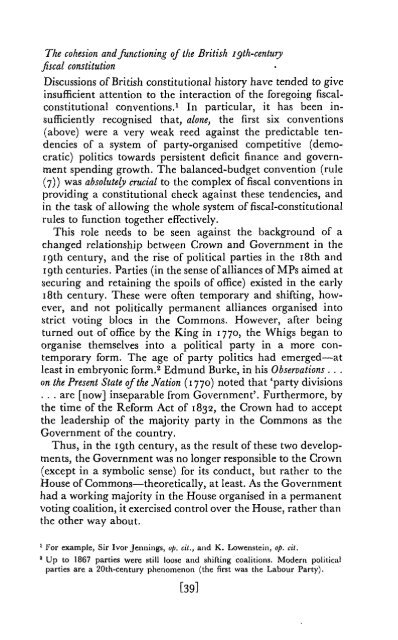THE CONSEQUENCES OF MR KEYNES.pdf - Institute of Economic ...
THE CONSEQUENCES OF MR KEYNES.pdf - Institute of Economic ...
THE CONSEQUENCES OF MR KEYNES.pdf - Institute of Economic ...
Create successful ePaper yourself
Turn your PDF publications into a flip-book with our unique Google optimized e-Paper software.
The cohesion and functioning <strong>of</strong> the British igth-century<br />
fiscal constitution<br />
Discussions <strong>of</strong> British constitutional history have tended to give<br />
insufficient attention to the interaction <strong>of</strong> the foregoing fiscalconstitutional<br />
conventions. 1 In particular, it has been insufficiently<br />
recognised that, alone, the first six conventions<br />
(above) were a very weak reed against the predictable tendencies<br />
<strong>of</strong> a system <strong>of</strong> party-organised competitive (democratic)<br />
politics towards persistent deficit finance and government<br />
spending growth. The balanced-budget convention (rule<br />
(7)) was absolutely crucial to the complex <strong>of</strong> fiscal conventions in<br />
providing a constitutional check against these tendencies, and<br />
in the task <strong>of</strong> allowing the whole system <strong>of</strong> fiscal-constitutional<br />
rules to function together effectively.<br />
This role needs to be seen against the background <strong>of</strong> a<br />
changed relationship between Crown and Government in the<br />
19th century, and the rise <strong>of</strong> political parties in the 18th and<br />
19th centuries. Parties (in the sense <strong>of</strong> alliances <strong>of</strong> MPs aimed at<br />
securing and retaining the spoils <strong>of</strong> <strong>of</strong>fice) existed in the early<br />
18th century. These were <strong>of</strong>ten temporary and shifting, however,<br />
and not politically permanent alliances organised into<br />
strict voting blocs in the Commons. However, after being<br />
turned out <strong>of</strong> <strong>of</strong>fice by the King in 1770, the Whigs began to<br />
organise themselves into a political party in a more contemporary<br />
form. The age <strong>of</strong> party politics had emerged—at<br />
least in embryonic form. 2 Edmund Burke, in his Observations . . .<br />
on the Present State <strong>of</strong>the Nation (1770) noted that 'party divisions<br />
. . . are [now] inseparable from Government'. Furthermore, by<br />
the time <strong>of</strong>the Reform Act <strong>of</strong> 1832, the Crown had to accept<br />
the leadership <strong>of</strong> the majority party in the Commons as the<br />
Government <strong>of</strong> the country.<br />
Thus, in the 19th century, as the result <strong>of</strong> these two developments,<br />
the Government was no longer responsible to the Crown<br />
(except in a symbolic sense) for its conduct, but rather to the<br />
House <strong>of</strong> Commons—theoretically, at least. As the Government<br />
had a working majority in the House organised in a permanent<br />
voting coahtion, it exercised control over the House, rather than<br />
the other way about.<br />
1 For example, Sir Ivor Jennings, op. cit., and K. Lowenstein, op. cit.<br />
a Up to 1867 parties were still loose and shifting coalitions. Modern political<br />
parties are a 20th-century phenomenon (the first was the Labour Party).<br />
[39]












